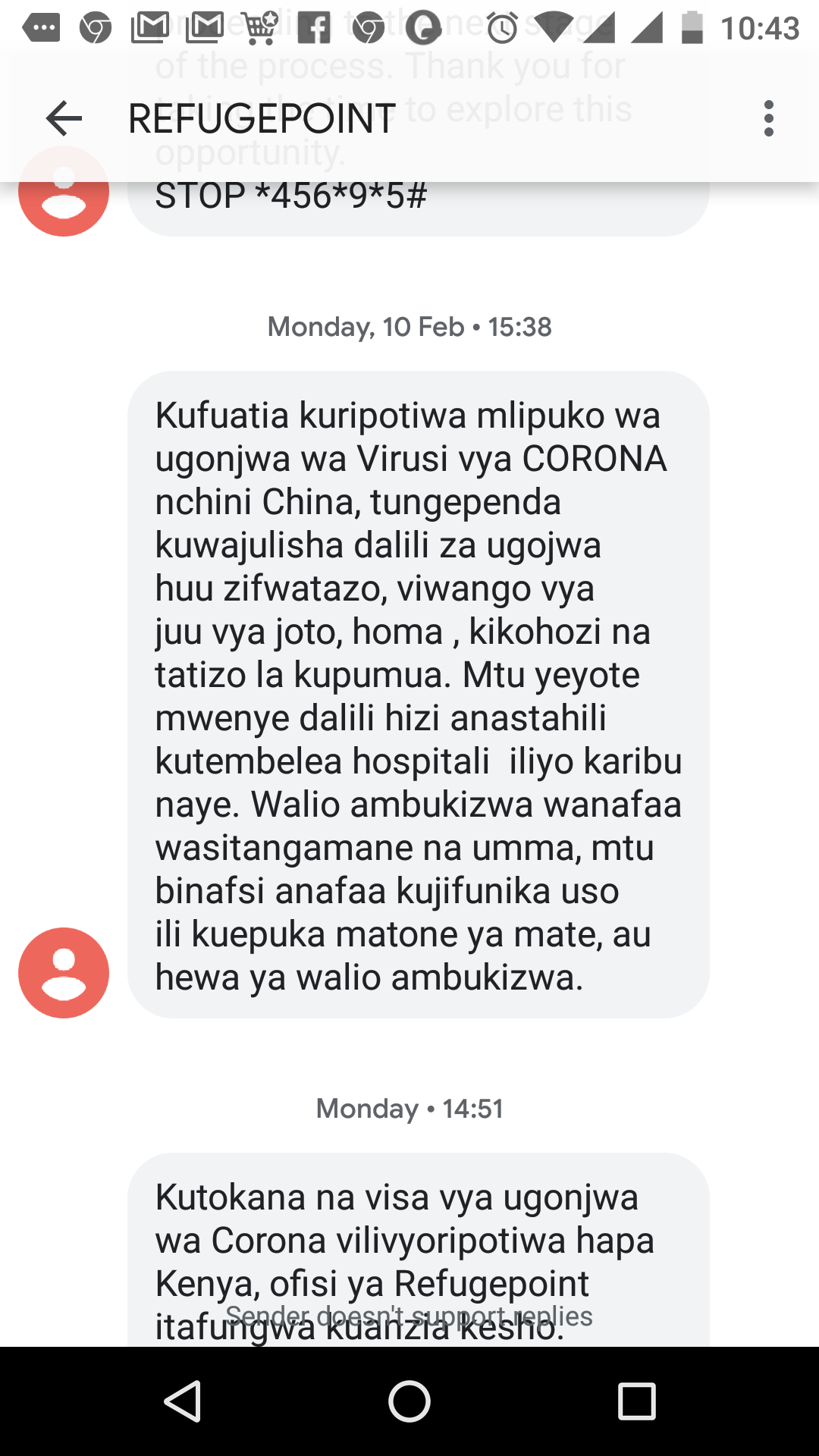RefugePoint is actively responding to the needs of refugee clients during the COVID-19 pandemic in Nairobi, Kenya. You’ll find frequent updates about our response in Nairobi here.
April 24, 2020
Providing Assistance to Refugees and Kenyan Nationals to Foster Social Cohesion
In the course of serving vulnerable refugees in Nairobi, we sometimes learn of Kenyan nationals in equally dire straits. They are sometimes the neighbors or friends of our clients, who bring them to our attention. Occasionally they are hosting refugees in their homes; sometimes, refugees are hosting them. In 2018, we carved out a small portion of our budget to support and enhance the natural social cohesion that we saw taking root.
Our ultimate goal is that 10% of our caseload will be comprised of Kenyan nationals. At the moment, Kenyan nationals represent 8% of our caseload. As core clients, Kenyan nationals are provided with a tailored, comprehensive suite of services, similar to what we offer refugee clients, including food and rent assistance, counseling, small business grants, education support, and medical assistance.
RefugePoint’s efforts to include Kenyan nationals builds on our objective to promote social and economic inclusion of refugees in Nairobi and provide a balance of individual, community, and systems-level supports within host countries like Kenya. It also contributes to a “whole of society” approach, where the focus is on community needs and resilience irrespective of immigrant/citizen status.
When COVID-19 began to spread in Nairobi, we provided all of our clients, refugees and Kenyans alike, with handwashing stations and soap. Last week, Grace, a RefugePoint social worker, spoke to one of our newest clients, a Kenyan national named Mary*. Mary is a widow and a single mother of eight biological children and two adopted orphans. Before receiving food and rent assistance in February 2020, Mary was hopeless and overwhelmed by the heavy responsibility of caring for ten kids with no income. In addition to food and rent assistance, Mary and her children received from RefugePoint a handwashing station and soap. Mary informed us that all of her kids absolutely adore this new feature in their home and that their day now revolves around handwashing. They fill the bucket with water several times a day (especially after heavy rains), and have even been composing songs about handwashing.
Here is a video that Mary shared with us, featuring one of her children washing her hands at the handwashing station inside their home. The girl is singing in English and Swahili, “wash your hands, take the soap, wash your hands…now our hands are clean.”
*Name changed for protection
April 22, 2020
Businesses that Flourished Now Face Challenges Due to COVID-19
On this blog, we’ve shared stories about refugees who’ve found creative ways to survive during the COVID-19 pandemic in Nairobi. Refugees are incredibly resilient and entrepreneurial. Although many refugees have found innovative ways to continue earning a living, many refugee business endeavors, like many businesses around the world, don’t have much flexibility or room for rapidly changing sales tactics or reaching customers during a lockdown. Worldwide, economies have come to a standstill, and that is no different in Nairobi.
Two weeks ago we spoke to Divine, a client who received a small grant of $400 in October 2019. Using the grant money, Divine and her husband expanded their business of selling kitenge fabrics. The business flourished so much that they were able to use their profits to open a retail shop and also began selling boiled cereals.
By Christmas, Divine and her family noticed a dramatic change in their lives. To celebrate the holiday, they were able to enjoy meat, chapatis, and their favorite snacks. However, things have abruptly changed due to the COVID-19 outbreak. Due to poor sales, Divine and her husband had to stop selling fabric. Their retail shop remains open but has been struggling due to low sales and lack of supplies, especially flour, which Divine can no longer source from Uganda.
Consequently, Divine has been spending her capital and savings to feed her household. It has been difficult for Divine to explain the sudden change in diet, which now consists mostly of beans and Githeri (a mix of boiled beans and maize), to her children. Divine is contemplating closing the shop due to the operating costs, and in particular, the rent for her retail space.
Divine shared with us that her greatest worry is feeding her children. She and her husband are strategizing the next best step to find a steady income source to sustain them during the pandemic.
On April 21, we checked in with Divine again, and were thrilled to hear that she has been able to keep her business operational, despite her fears that she’d be forced to close it. Divine has been able to keep her business open, as her landlord gave her an extension to pay for rent at a later date. After receiving training at her church about how to make liquid soap, Divine has now also begun producing and selling soap.
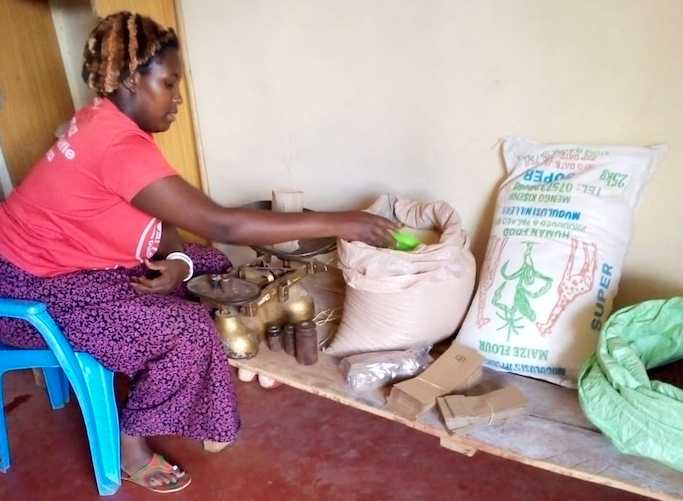
April 8, 2020
Entrepreneur tailors begin producing and selling face masks
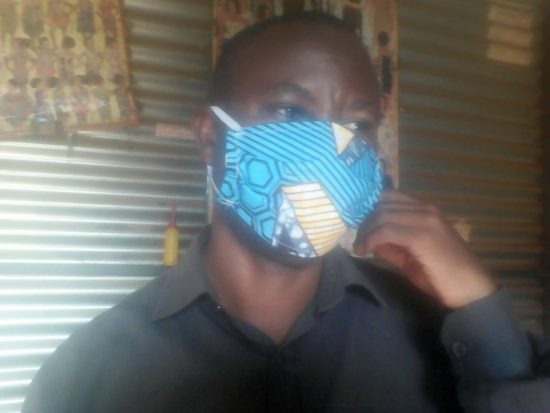
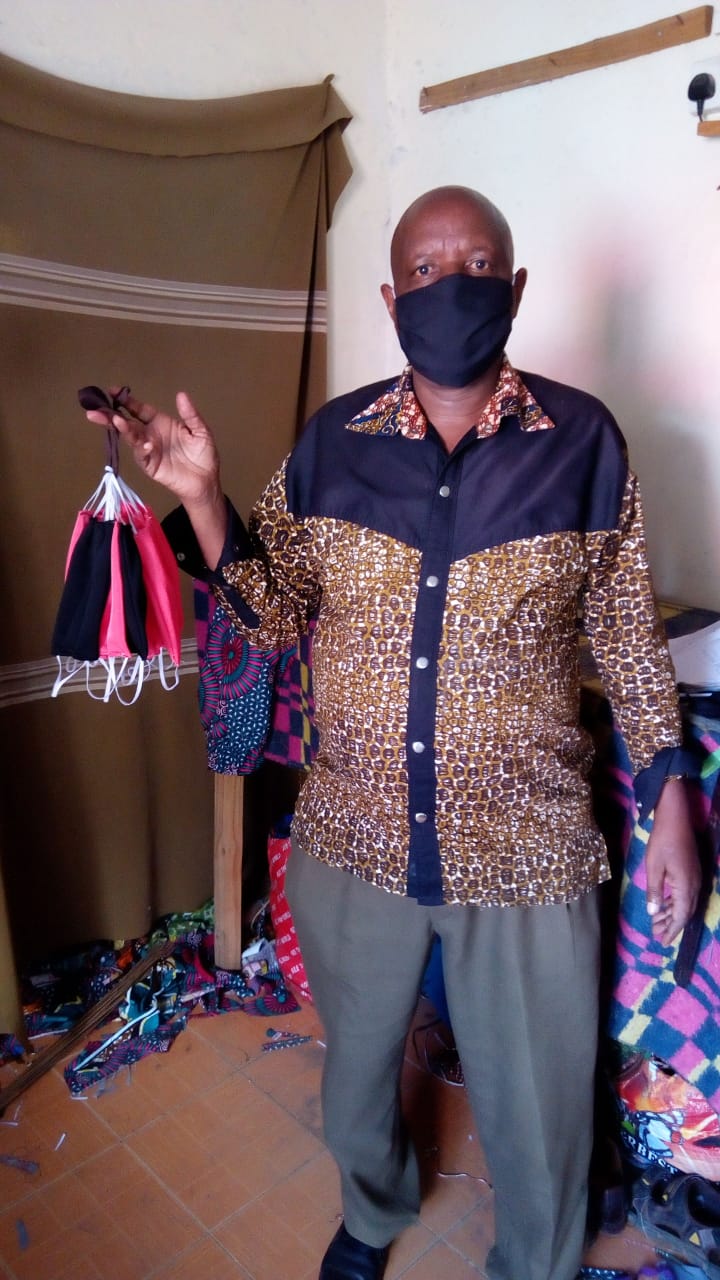
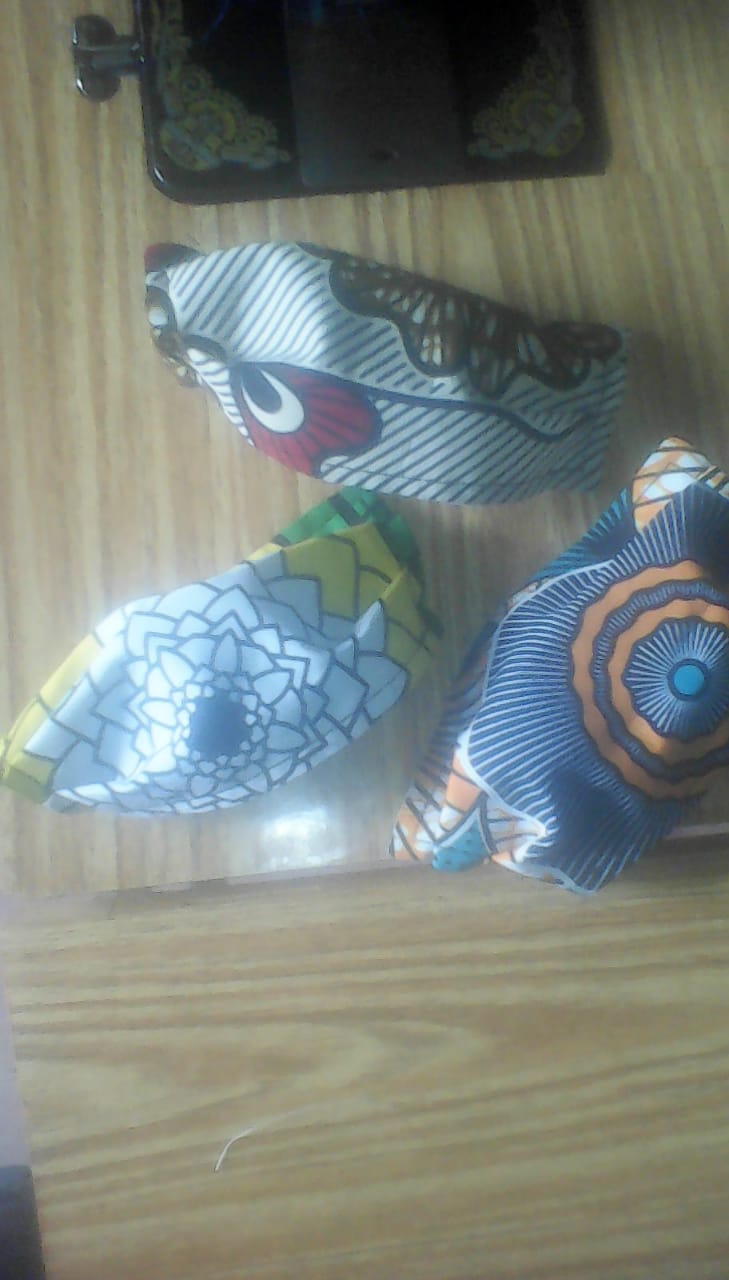
April 8, 2020
148km to deliver emergency drugs to clients
Today, we’d like to highlight a group of RefugePoint team members who have been working especially hard during the COVID-19 pandemic—our medical team. Back on March 25, RefugePoint’s medical team coordinated the filling and delivery of prescription drugs to over 200 clients. Once prescriptions were filled, our drivers collected the orders from local pharmacies and delivered them to Community Navigators throughout Nairobi, who ensured that all clients received the appropriate medications.
As you can see, from the screenshot below (from the online vehicle tracking software we use), on March 25, we covered 148km while delivering emergency drugs to clients. A huge kudos to the medical team, drivers, Community Navigators, and everyone else involved in ensuring that clients continue to receive support even during these trying times.
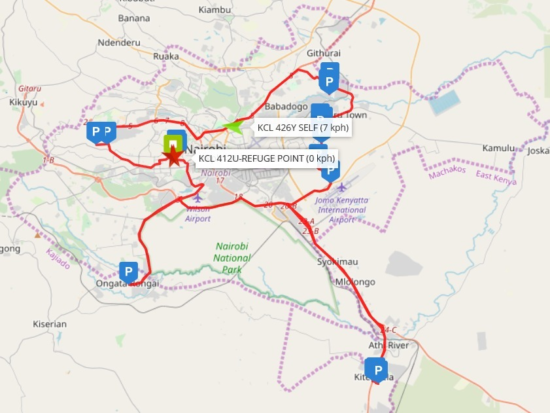
April 7, 2020
From economists to impromptu counselors
RefugePoint’s Livelihoods team assesses refugees on their ability to start a business and walks clients through the process of how to create business plans and run a successful business. For many refugees, the biggest struggle in starting a small business is the lack of initial capital for investment. We have learned that the best way to help our clients is to provide small cash grants (typically about $200) which are used to start or expand a business; serving as a pathway to self-reliance. RefugePoint staff monitor and advise entrepreneurs throughout all phases of small business planning, start-up, and expansion.
Today’s update comes from Belinda Muya, RefugePoint’s Livelihoods Program Manager. Belinda oversees the Livelihoods Program in Nairobi, Kenya and manages our excellent team of Livelihoods Associates, including Ayusa, Damaris, Ken, and Lilian.
“As a team that operates on technical processes founded on economics, we have found ourselves in unchartered waters during this challenging time. COVID-19 has brought uncertainty, anxiety, loss of livelihoods and a wave of other numerous socio-economic vulnerabilities to the refugee communities in Nairobi. Through regular phone calls with our clients, we have intensified our contact and technical support to the entrepreneurs whom we have financed. We are working to equip our clients with technical tools and advice to help them through this time, and to connect them with networks of support. However, we cannot separate the economics from the emotional health of those we serve. More and more, during our calls, we find ourselves offering a listening ear to our client’s fears and despair. We now find ourselves counseling on an emotional level as well–consoling, comforting, and dispelling anxieties. While we were unprepared for this sudden and weighty role, we embrace it in stride, understanding that we remain an oasis for the communities we serve.
Economically, this is a highly uncertain time. It is inevitable that many people’s livelihoods, including refugee’s, will be severely impacted by the pandemic. The market is disintegrating, cash-flow is affected, and many may not be able to spring back economically. We do not know for how long and what direction the situation will take. Nonetheless, as the livelihoods team, we are busy looking into recovery measures. We remain optimistic and have confidence in the resilient nature of those we serve. I’d like to send a big thank you shout-out to the amazing livelihoods team–may they remain as humorous and as dedicated as ever!” (see April 6 post below for examples of refugee clients who are finding ways to survive and thrive during the pandemic).
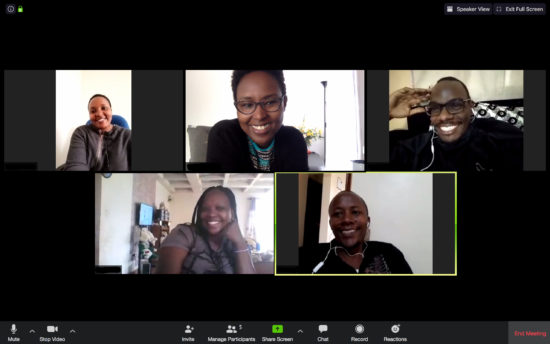
The Livelihoods team (Lilian, Belinda, Ayusa, Damaris, and Ken) on a recent Zoom call.
April 6, 2020
Refugees in Nairobi finding ways to survive and thrive during COVID-19 pandemic
Last week, during a call with managers from our Nairobi office, we heard stories about a few refugee clients who’ve figured out ways to survive, and in some instances, thrive, despite the challenging times brought on by the spread of COVID-19 in Nairobi, Kenya. Here are a few of their stories:
Sam*: As many companies rush to increase the production of hand sanitizers in the wake of the increased demand, Sam was able to secure employment in a company that produces hand sanitizers. He has worked there for about three weeks now, earning about $30 per week. Sam’s business had recently collapsed, and he was struggling to make ends meet for his young family, so this has been a life-saving opportunity for him.
Charity*: Charity is very enterprising! With the news that hand sanitizers were quickly running out of stock, she jumped at the opportunity and was able to source a large consignment of hand sanitizers, which she is reselling at high profit margins. She reached out to us to share the news.
Irene*: Irene sells tomatoes and beans. She reported that her business selling beans is booming since the onset of the COVID-19 pandemic. She attributes this to the fact that (1) beans are a staple in many homes and, (2) there is a limited supply of foodstuffs in the community. Markets have shut down, limiting wholesale supply. Many vendors have also closed. Irene is able to find sources to maintain her stock, and she is one of the very few vendors who are still operating and selling pre-boiled beans in her community.
Dawn*: Dawn runs a business selling kitenge fabric. Unfortunately, most kitenge vendors have shut down their businesses due to very low sales and limited mobility. Dawn, however, shared with us that her business is booming, because she quickly discovered that many tailors did not have fabric, as most fabric wholesalers have closed shop. Many tailors fear traveling to buy fabric. Dawn is closing this gap. She has been able to maintain a good stock of kitenge and delivers them to the tailors.
Matt*: Matt operates a liquefied petroleum gas (LPG) business as well as a small restaurant. Although Matt’s restaurant business has slowed down, his gas business is booming due to the increased price on refills (from about $7.50 to about $10.50) as well as a steep rise in demand as clients rush to stockpile supplies.
Khadija*: Khadija sells tomatoes in the Githurai market. Before the COVID-19 pandemic, she used to sell one crate of tomatoes over a 3-4 day period. However, she is now reporting high sales of at least one crate per day, and she is also able to sell at a higher price than usual. With the closure of open-air markets, Khadija is working to secure space on the roadside to continue with her trade.
* Client names changed for protection.
April 1, 2020
Reaching 5000+ Refugees with Public Health Messages Via Text Messaging
One of the key resources for communication with refugee clients that we are using right now in Nairobi is our bulk SMS system. Using the system we are able to send out RefugePoint-branded SMS text messages to all of our clients with the click of a button. We’ve sent many messages so far, including hotlines to call if one suspects they are infected, coronavirus symptoms, health and safety measures, government regulations (such as the recently imposed dusk to dawn curfew), and messages of hope – reassuring clients not to fear. During a time when fake news is rampant, our clients can trust us to update them with the life-saving and accurate information. These messages reach about 5,000 refugees and are translated into Swahili, Oromo, and Somali.
The message below (in Swahili), reads:
“If you have any of the following symptoms: fever, cough, fatigue or difficulty breathing, call one of these numbers. Health care staff will ask you a number of questions over the phone to decide if you need further medical examination at the hospital.”
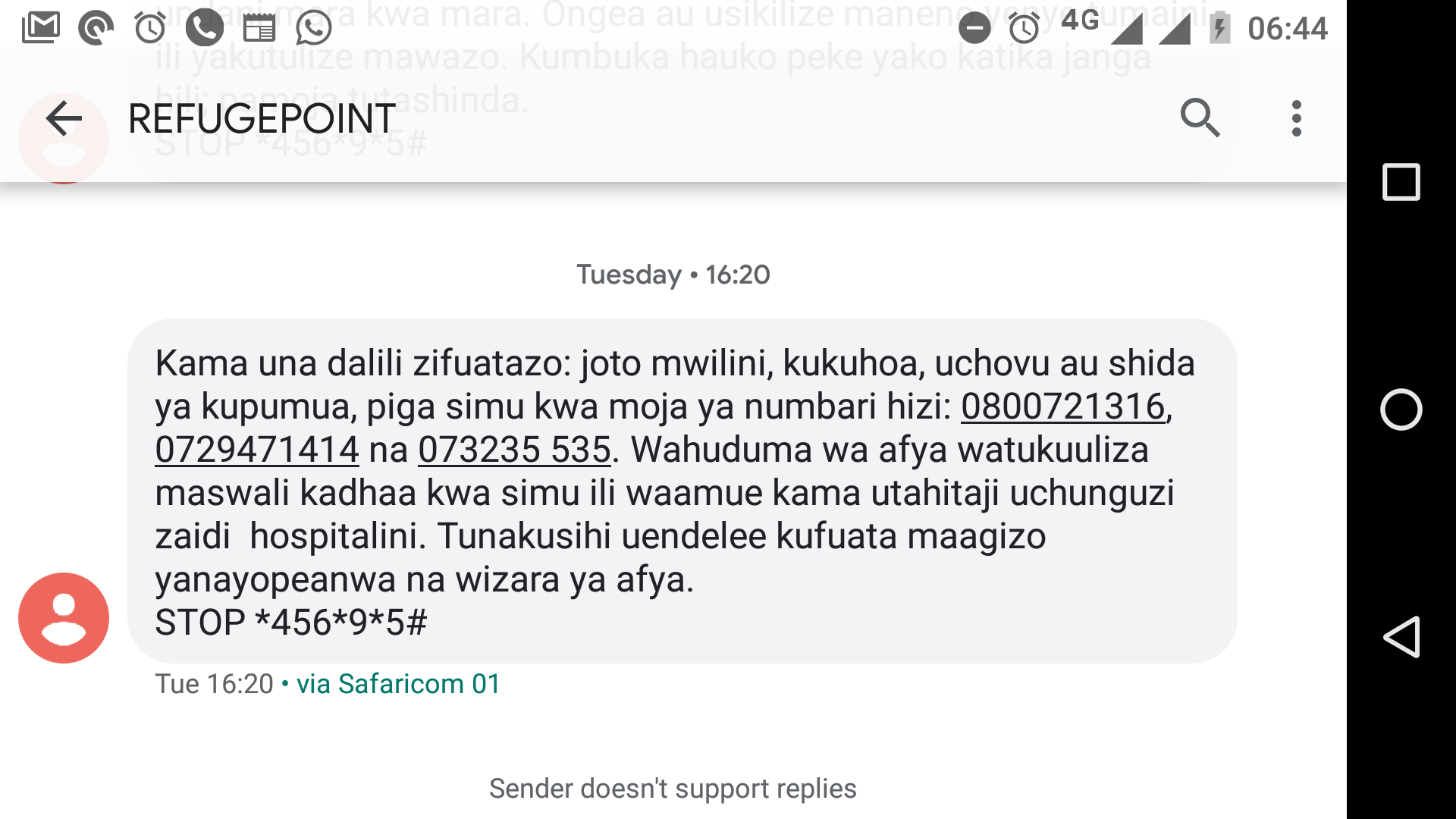
March 31, 2020
Training Community Navigators on the Proper Use of Personal Protective Equipment
Today, RefugePoint’s team of Community Navigators (CNs) attended a remote training, which they joined over Zoom from their respective locations throughout Nairobi. The training focused on answering questions about and providing demonstrations on the safe and proper use of personal protective equipment (PPEs) like gloves, face masks, and protective garments.
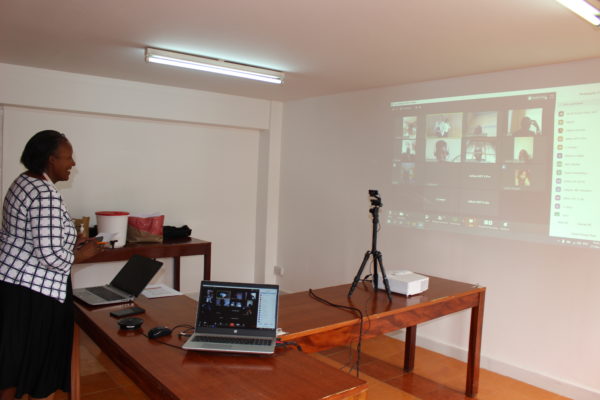
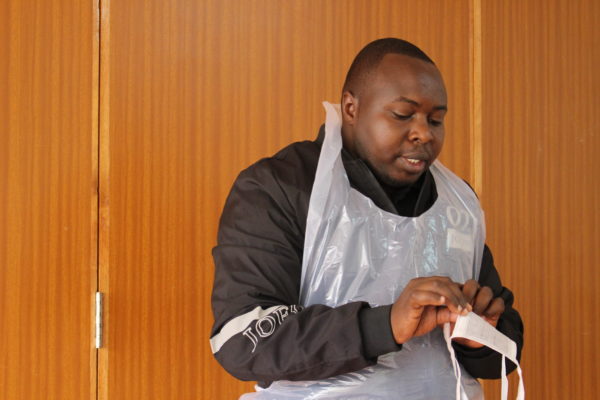
March 30, 2020
Distributing Medications to Clients Throughout Nairobi
Today, a few members of RefugePoint’s Nairobi team, including Mary, our Health Program Manager, prepared and packaged medication for distribution to our clients throughout Nairobi.
Mark, one of our wonderful drivers, helped to deliver the medications to our clients.
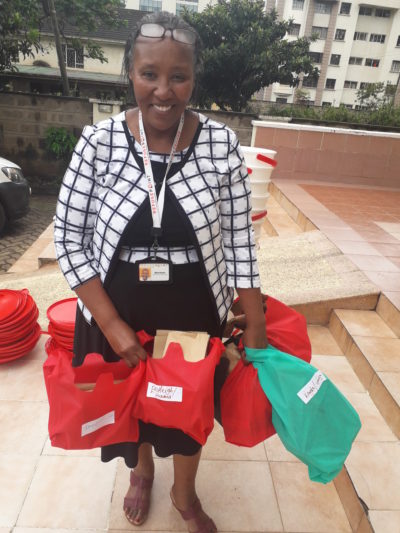
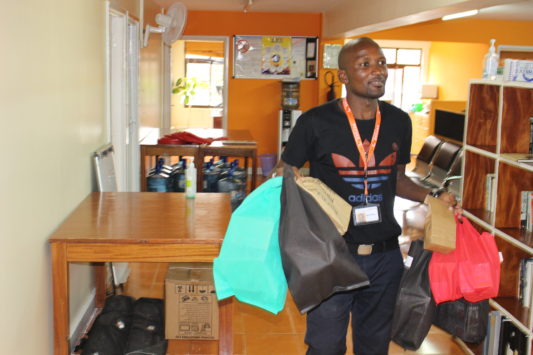
March 27, 2020
Staff Distribute More Handwashing Buckets to Refugee Clients
Today, the Nairobi staff carried out another large distribution of handwashing buckets to our refugee clients throughout Nairobi. Each bucket holds 20 liters of water, and we believe these will work very well to enhance handwashing protocol among clients.
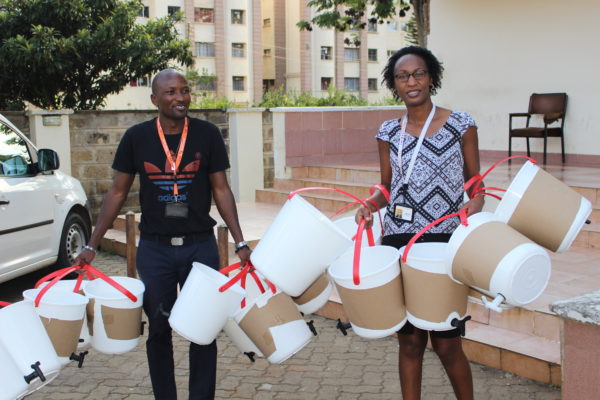
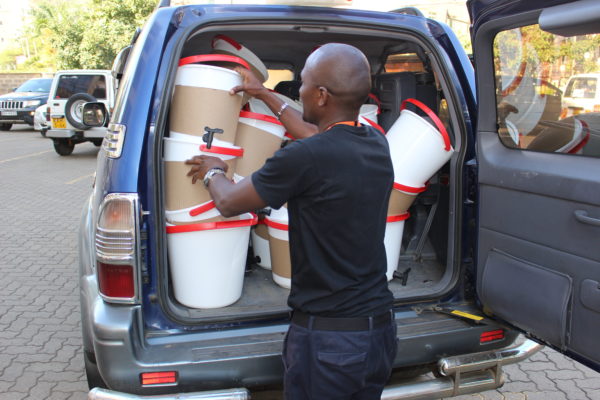
March 26, 2020
Community Navigators Help Us to Disseminate Public Health Information
RefugePoint’s team of incredible Community Navigators (CNs) help us to disseminate critical public health information to refugee communities throughout Nairobi. CNs are refugees themselves, who live and work in the communities they serve. They play a crucial role in delivering life-saving health messages and ensuring that community members have access to the prescriptions and other resources they need to stay healthy. Community Navigators typically spend a lot of time interacting face-to-face with refugee clients and visiting the homes and businesses of the refugees we serve. Due to the need for social distancing during the COVID-19 pandemic, CNs are limiting their community visits and increasing their outreach via phone and text messaging.
This week, CNs and other staff are busy identifying our most at-risk refugee clients, including elderly clients and those with pre-existing medical conditions, and are implementing several targeted interventions.
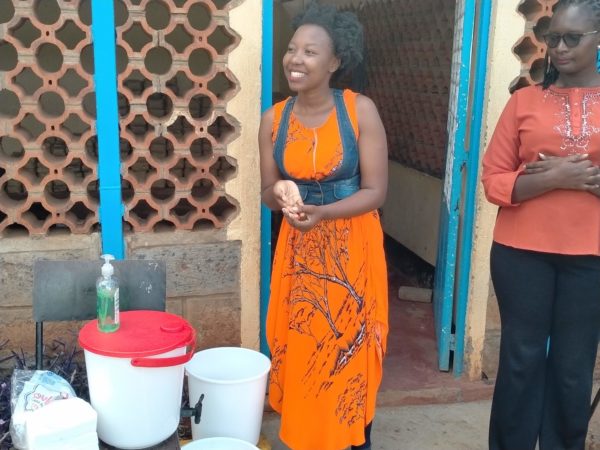
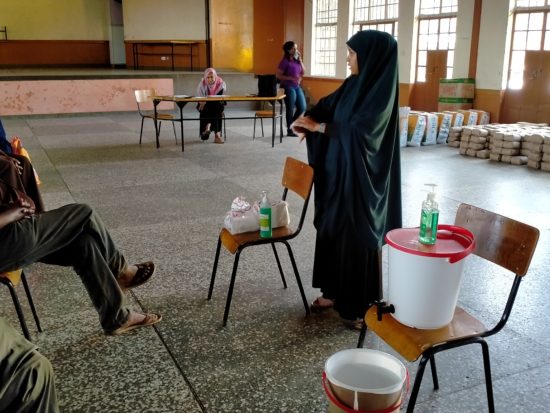
March 24, 2020
Distribution of Food and Handwashing Stations
As we prepare for the possibility of restricted movement in Nairobi, this week’s focus is on the early distribution of April food assistance to our clients. During food distribution, we are also providing clients with handwashing stations and giving demonstrations about proper hand-washing techniques. At the same time, we are sharing general information on how to reduce the risk of COVID-19 infection. Over the next few days, we will also ensure that clients have access to a two-month supply of all medications.
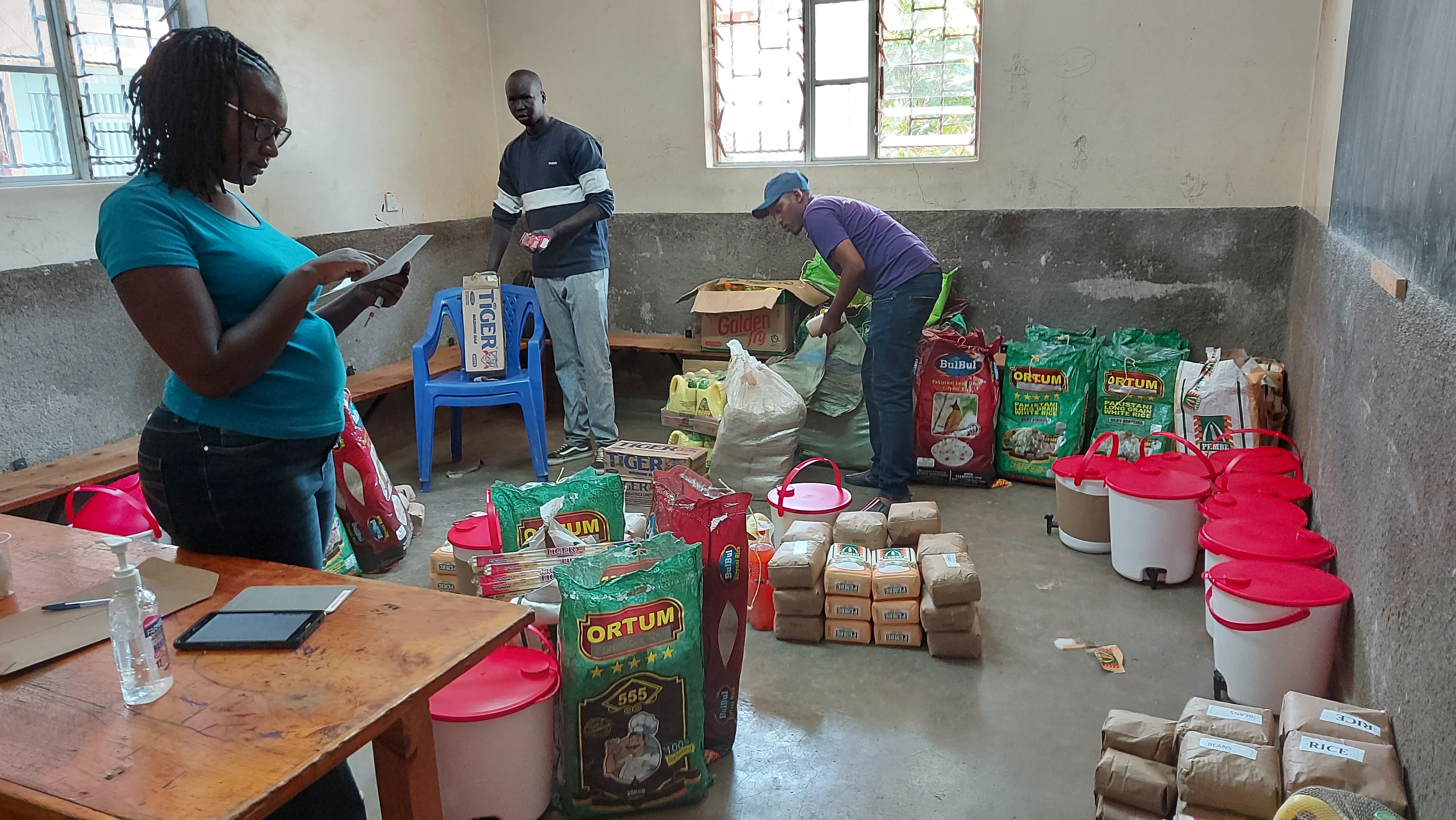
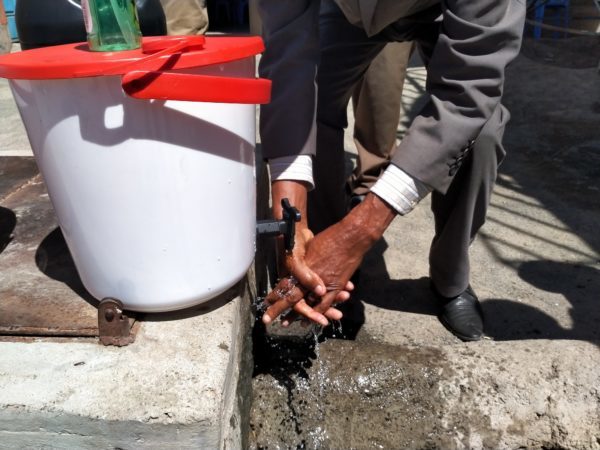
March 23, 2020
Programming Continues Remotely
This week, in response to the COVID-19 pandemic, most of the RefugePoint’s programming is continuing remotely. Just a few days ago, a typical day at the RefugePoint Nairobi office would have involved refugee clients visiting our office to do things like: seek medical care, meet with their social workers, pick up rent support, and attend counseling sessions. Many RefugePoint staff would also have been traveling around Nairobi, visiting client businesses, and making home visits.
Now, instead of meeting face-to-face for counseling sessions, clients are receiving counseling over the phone. Now, rather than the livelihoods team visiting client businesses across Nairobi, the livelihoods team is providing entrepreneurs with mentorship over the phone. Now, instead of social workers visiting client’s homes and meeting face-to-face, case planning is being conducted over the phone. The only services that have been fully suspended at this time are those that require large group gatherings, including group counseling sessions and business workshops.
March 23, 2020
Refugee Resilience During the COVID-19 Pandemic
Today, Ken, a RefugePoint Livelihoods Associates, connected with a client who has started a booming business selling hand sanitizers in Kasarani. Kasarani is a densely populated area of Nairobi with many Kenyans as well as Congolese refugee communities. This is another beautiful case of refugee resilience.
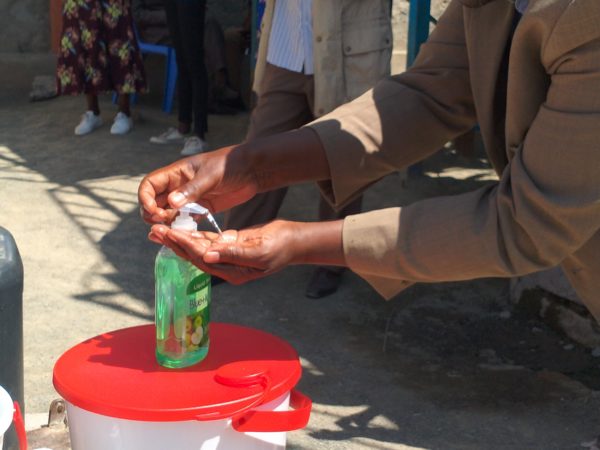
March 22, 2020
How COVID-19 is Impacting Refugee Businesses in Nairobi
Ayusa, a RefugePoint Livelihoods Associate, has been monitoring the businesses of our refugee clients. During the COVID-19 pandemic, clients are coping in various ways. One of our clients runs a barbershop business, and business has slowed down significantly due to COVID-19. The client decided to set up a hand-washing station in front of his business as a hygiene measure for his customers. Now, all of his clients can wash their hands before being served.
Ayusa also noticed that customers are paying for merchandise they buy via the mobile payment platform (M-pesa), rather than in cash. Some of our clients are denied access to the M-pesa platform due to documentation challenges. These clients are forced to use friends’ cell numbers as a proxy to receive payments.
Some of our clients have experienced a delay in receiving supplies and price increases for the merchandise they sell – particularly imports from China, like clothes.
Unable to make in-person field visits due to COVID-19, Ayusa and other RefugePoint staff are frequently using WhatsApp to communicate with and check in on clients.
March 21, 2020
The COVID-19 Pandemic From A Parent’s Perspective
Mary, RefugePoint’s Training Manager, shared some feelings that she is having as a parent during the COVID-19 pandemic:
“As a parent, it has been a week filled with anxiety. We have been trying to think of the best ways to protect our children, both from catching the virus and from the fake news regarding COVID-19, which has been spreading quite fast. I imagine that our refugee clients, a large number of whom are parents, must be facing even higher levels of uncertainty. Their homes may not allow for social distancing, as we know that there are households with many family members sharing only one or two rooms. It’s a difficult time for parents across the globe, but it’s an even more difficult time for refugee parents who have few options when it comes to social distancing.”
March 20, 2020
The Impact of School Closures in Nairobi
Kimani, RefugePoint’s Education Officer, has noted that the impact of COVID-19 on all of our education beneficiaries will be immense, since all are now home, following the school closures to combat COVID-19.
This year, the Education Program will be graduating the highest number of Grade 8 and Form 4 students in the history of our program. Eighteen of our secondary school beneficiaries and 35 primary school scholarship beneficiaries are scheduled to sit for their major exams (i.e. Kenya Certificate of Secondary Education and Kenya Certificate of Primary Education) at the end of the year. They are supposed to be vigorously preparing for these exams now with the guidance of their teachers. However, with the closure of all schools, students are missing out on their teachers’ guidance. This is likely to affect general performance in the exams.
Parents and guardians now have to miss work to care for their children or look for alternative caregivers.
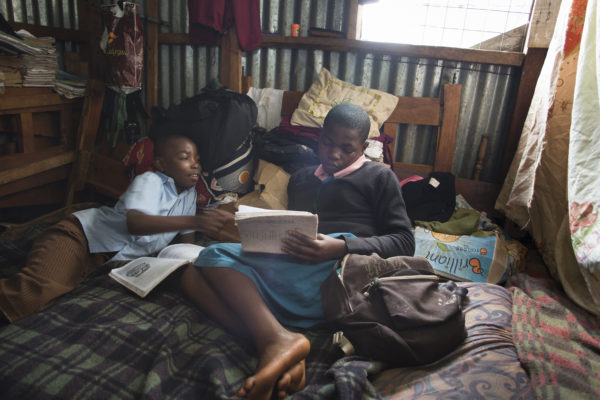
March 19, 2020
Purchasing Handwashing Stations for Refugee Clients
We began purchasing handwashing stations that are similar to those we set up in RefugePoint’s Nairobi office last year in response to chronic water shortages in Nairobi. Each one holds 20 liters of water, and we believe these will work very well to enhance handwashing protocol among clients.
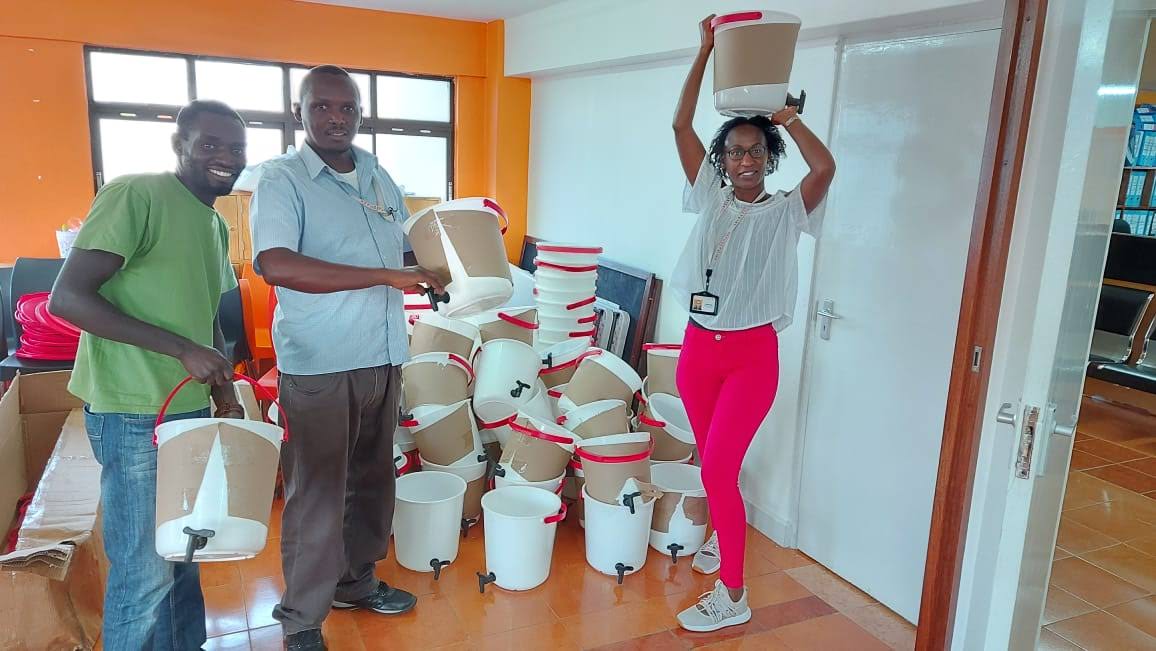
March 18, 2020
Filling a Critical Public Health Gap
For many of our refugee clients, we are their sole source of reliable information about COVID-19, and in this respect, RefugePoint fills a critical public health gap. We send frequent SMS text message updates about COVID-19. These messages reach about 5,000 refugees and are translated into Swahili, Oromo, and Somali. The message we sent out on March 19, 2020 had the following text:
“li kuzuia kupata virusi vya corona, osha mikono yako na sabuni na maji mara kwa mara. Fuata maagizo ya serikali. Jiepushe kuwa kwa vikundi vya watu wengi. Ikiwa una homa, kikohozi au ugumu wa kupumua, tafuta huduma za matibabu haraka iwezekanavyo. Nambari za simu za dharura za Wizara ya Afya ni: 0800 721 316, 0729 471 414 na 0732 353 535″
The translation is:
“To prevent getting the coronavirus, wash your hands with soap and water frequently. Follow the instructions of the government. Avoid being in groups of people. If you have a fever, cough or difficulty breathing, seek medical care as soon as possible. Emergency telephone numbers of the Ministry of Health are: 0800 721 316, 0729 471 414 and 0732 353 535.”
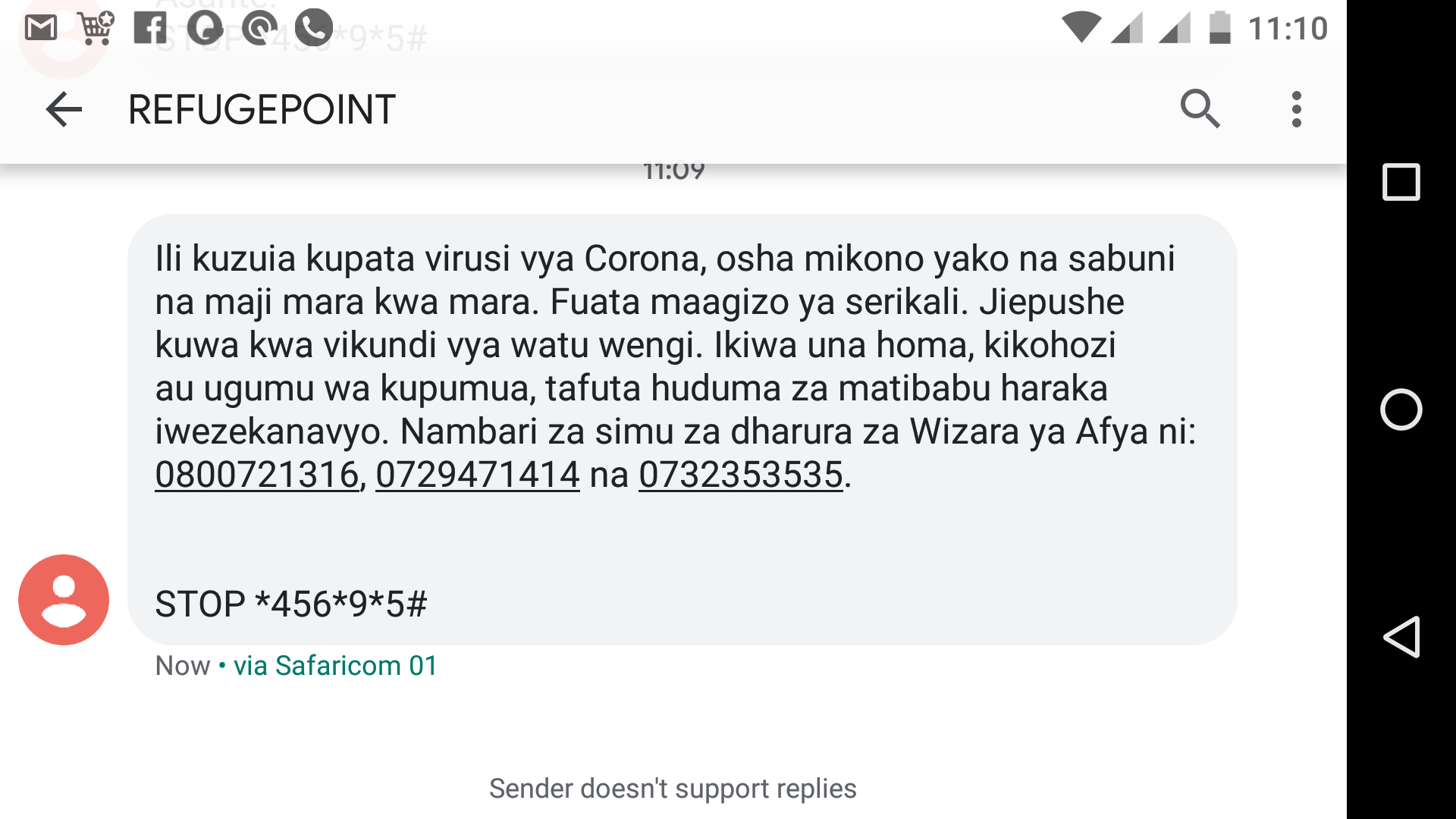
March 17, 2020
Community Navigators Take the Pulse of Refugee Communities Response to COVID-19 in Nairobi
Our staff and Community Navigators have their ears to the ground and are in close communication with the many refugee populations living across Nairobi. We have learned about the challenges that each area/refugee population is facing and are developing plans for how to address those challenges. Some communities face a lack of hand hygiene supplies, many are still lacking basic information about COVID-19, some are attempting to limit crowds, while others continue to gather in large groups. Each community faces unique challenges, and our response will be tailored to each community.
Ann-Marie, RefugePoint’s Community Navigator in Kawangware, shared with us how refugees in Kawangware are feeling right now: “Life with COVID-19 has been extremely difficult, especially since learning institutions closed, and people must limit movements and public gatherings. Refugees have been impacted severely. Many refugees living in Nairobi depend on casual work and running small businesses for survival and income generation. Most of the refugees living in my area are in a desperate situation. Their major concern is that the schools have closed and they are staying indoors. No businesses are generating income because there are no customers. Everyone is afraid. Those who were surviving on casual work are suffering since no one is offering work.
Talking with a number of refugees in the community, they told me, ‘Everything has stopped. We have no money and no food. Our children are at home, and we don’t know what to do.’ Even getting hand sanitizer is a problem because it is out of stock or simply unaffordable. Some refugees depend on buying water, and at a time like this, given the economic turmoil, that will be a cost they cannot afford. Refugees in my community are concerned that many organizations that were assisting refugees have also closed. Their wish is that humanitarian agencies can lend them assistance because they have no backup plans to address such an unexpected crisis.”
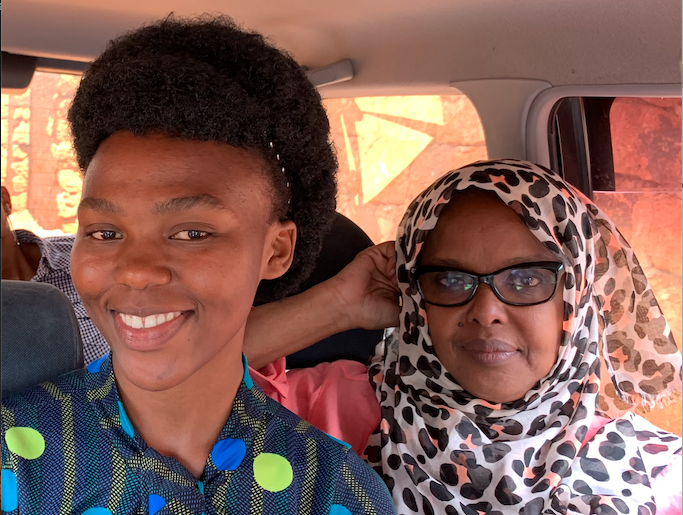
February 10, 2020
The First COVID-19 Related Message Sent to Our Refugee Clients
We sent out the first mass SMS text message regarding COVID-19 to our refugee clients. This message was sent to 1585 mobile phone owners, and we estimate that about 5,000 refugees are reached with each message.
The message translates to:
“Following reports of an outbreak of the coronavirus disease in China, we would like to inform you that the disease has the following symptoms, high temperatures, fever, cough, and difficulty in breathing. Anyone with these symptoms should visit the nearest hospital. The infected should avoid contact with the public, and the individual should cover their face to avoid (spreading) saliva drops in the air.”
